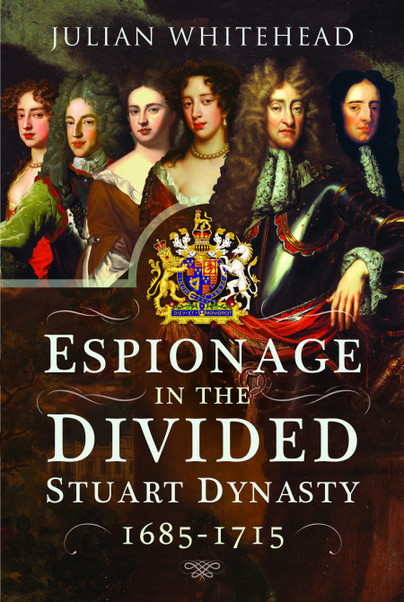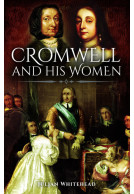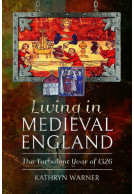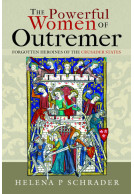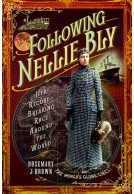Espionage in the Divided Stuart Dynasty (ePub)
1685 - 1715
Imprint: Pen & Sword History
File Size: 11.6 MB (.epub)
Pages: 240
ISBN: 9781526748539
Published: 14th September 2020
Star review
"Shines a dazzling light on the dark and treacherous world of the later Stuart court. Spies, conspiracies and intrigue abound in this well researched and engagingly written narrative." (~Tracy Borman)
| Other formats available - Buy the Hardback and get the eBook for £1.99! | Price |
|---|---|
| Espionage in the Divided Stuart… Hardback Add to Basket | £25.00 |
King James II was the Catholic king of a Protestant nation, but he had inherited a secure crown and was able to put down the rebellion by his nephew the Duke of Monmouth. In just over three years James had been deserted by those he loved and trusted and had to flee to France in exile. His throne was seized by his son-in-law and daughter, and when they died, his younger daughter succeeded. For James it was a personal tragedy of King Lear proportions; for most of his subjects it was a ‘Glorious Revolution’ that saved his kingdoms from Popery.
Over the next hundred years James or his descendants would attempt to win back the crown with French support and conspiring with British Jacobites and Tories. In Espionage in the Divided Stuart Dynasty Julian Whitehead charts the inner workings of government intelligence during this unstable period, where it was by no means a forgone conclusion that James or his heirs would never regain the throne. It throws light on the murky world of spies and double agents at a time of intensive intrigue and betrayal, with many politicians and peers trying to keep a foot in both camps. It was especially important in such circumstances for a monarch to receive good intelligence about the many intrigues, but could those providing the intelligence be trusted?
Espionage in the Divided Stuart Dynasty 1685-1715 by Julian Whitehead is a good start if you want to learn about the divisions in the Stuart dynasty.
History of Royal Women Blog
"For those wishing to learn about the intricacies of the Stuart era it can be recommended."
Family and Community Historical Research Society Newsletter, Volume 22, November 2021
Featured by
The Pike and Shot Society
King James II was the Catholic king of a Protestant country, but he had inherited a secure crown and was able to put down the rebellion by his nephew the Duke of Monmouth. In just over three years James had been deserted by those he loved and trusted and had to flee to France in exile. For James it was a personal tragedy of King Lear proportions; for most of his subjects it was a Glorious Revolution that saved his kingdom from Popery. A book about government intelligence during an unstable period of time.
UK Historian
The Stuart times was a period of religious upheaval in history, so no wonder this saw a period dominated by spies and espionage amongst the major players of the time. This book shows a good analytical survey of the subject and has been very well and thoughtfully written by the author Julian Whitehead. The book is also written in a style where the author presumes the reader knows the basics about the characters and people involved, rather than giving basic introductions to the story. This is a fascinating story and I would say it would be a must for all fans of the Stuart family and dynasty, if you are a new learner give it a read but get to know the major players first, which will help. We well written book and would definitely come with a five start rating.
5 stars
Read the full review here
Shines a dazzling light on the dark and treacherous world of the later Stuart court. Spies, conspiracies and intrigue abound in this well researched and engagingly written narrative.
Tracy Borman, Historian and Author
This is an easy book to read. Whitehead engages the reader and maintains a brisk pace... An excellent book.
The Jacobite Journal, November 2020
Wow, I really enjoyed this. It boils down the history from Charles II through Anne, focusing purely on the attempted and successful coups that happened. So, James II coming to the throne, the fight that overthrew him and put William III and Mary II on, the squabbles that happened during the dual reign, Anne's rule and the Pretender, etc. It was a very good read. I was familiar with quite a bit of this, but that didn't matter to me because familiarity doesn't mean I know all the details and I definitely learned a lot while my memory was refreshed as well. Definitely a book I'd want to own in the future to round out my British history shelf!
NetGalley, Caidyn Young
30 years of history with a focus on the role intelligence played in the shaping of the United Kingdom of Britain. As the author says in the introduction, the subject matter is espionage and conspiracy but the theme is loyalty. This history was not just a summation of dry facts, it was interesting history told well brought to life with stories and small (maybe insignificant) facts. For example, the man who participated in a rebellion, was arrested, and amputated his own arm with a pen knife while waiting for examination.
NetGalley, Janelle Hoos
This was an interesting book that tells the history of the Stuart period. It was written well and was very informative.
NetGalley, Kate Phillips
When Charles II died in 1685 he left a nation torn between the Protestantism established by his predecessors, and the Catholicism that quietly marked his own religious sympathies and those of his heir, James II. The challenges presented to a Catholic King ruling a nation which, on the surface at least, was Protestant, would require careful consideration and a thorough understanding of the threat posed by dissenters and pretenders.
NetGalley, Alexandra BestFirstLines
Whitehead’s account sets out a forensic analysis of the complex manoeuvres undertaken to prevent this latent religious tension manifesting as outright political unrest. The existential threat presented by conspirators was not one to be taken lightly and the importance of up-to-date, quality intelligence is certainly apparent through the narrative.
To state the obvious, this book is not an introduction to the subject, and it helps to have a reasonable understanding of the main players and historical context before undertaking a deep dive into the intrigues and machinations of James’ court. For an overview of the Stuart kings, however, or the back-and-forth controversies over religion in Britain in the period, there are a number of sources which are helpfully included in the index.
Whitehead does a fantastic job of bringing complex, nuanced figures into the light, a personal favourite being his description of the role of Charles Middleton, James’ ruthless chief adviser. His forensic command of his subject gives a tangible credibility to the narrative. Whitehead’s own professional experience in government intelligence brings a new angle to the study of the subject, and his writing has a clarity and gravitas which is well-suited to his material.
The detailed appraisal of the descent of the Duke of Monmouth, for example, sets out a clear account of events as they transpired. Some readers may like to see a deeper analysis of contemporary feeling about such upheaval, but this is arguably outside of the scope the author has set for himself. If you are interested in an impassive, forensic description of the behind-the-scenes plotting and counter-plotting in this period of stark religious division, this is the book for you. Ultimately, a great spy story is intriguing regardless of the century.
About Julian Whitehead
Julian Whitehead read History at Oxford after which he joined the Intelligence Corps and spent a full career in military intelligence; his appointments have included Chief of Staff of the Defence Intelligence Centre and Deputy Director of Defence Security. After leaving the army he spent ten years as Security Advisor to Historic Royal Palaces and is now retired and lives in Oxfordshire. Pen and Sword have publish his previous books Cavalier and Roundhead Spies in 2009, Rebellion in the Reign of Charles II in 2017, Cromwell and his Women in 2018 and Espionage in the Divided Stuart Dynasty 1685-1715 in 2020







